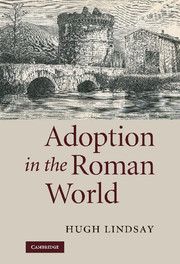Book contents
- Frontmatter
- Contents
- List of figures
- Preface
- List of abbreviations
- Introduction
- 1 Adoption, kinship and the family: cross-cultural perspectives
- 2 Kinship in Greece and Rome
- 3 Greek adoptions: comparisons and possible influences on the Roman world
- 4 Procedural aspects of Roman adoption
- 5 The testamentary adoption
- 6 Roman nomenclature after adoption
- 7 Adoption and inheritance
- 8 Roman freedmen and their families: the use of adoption
- 9 Adoption in Plautus and Terence
- 10 Sallust and the adoption of Jugurtha
- 11 Adrogatio and adoptio from Republic to Empire
- 12 Testamentary adoptions – a review of some known cases
- 13 Political adoptions in the Republic
- 14 Clodius and his adoption
- 15 The adoption of Octavian
- 16 Political adoption in the early Empire at Rome, Pompeii and Ostia; the imperial family
- Conclusion
- Glossary
- References
- Index
15 - The adoption of Octavian
Published online by Cambridge University Press: 25 January 2010
- Frontmatter
- Contents
- List of figures
- Preface
- List of abbreviations
- Introduction
- 1 Adoption, kinship and the family: cross-cultural perspectives
- 2 Kinship in Greece and Rome
- 3 Greek adoptions: comparisons and possible influences on the Roman world
- 4 Procedural aspects of Roman adoption
- 5 The testamentary adoption
- 6 Roman nomenclature after adoption
- 7 Adoption and inheritance
- 8 Roman freedmen and their families: the use of adoption
- 9 Adoption in Plautus and Terence
- 10 Sallust and the adoption of Jugurtha
- 11 Adrogatio and adoptio from Republic to Empire
- 12 Testamentary adoptions – a review of some known cases
- 13 Political adoptions in the Republic
- 14 Clodius and his adoption
- 15 The adoption of Octavian
- 16 Political adoption in the early Empire at Rome, Pompeii and Ostia; the imperial family
- Conclusion
- Glossary
- References
- Index
Summary
The adoption of Octavian has in the past been considered controversial, but today there is something approaching consensus. Recent studies have suggested that the abnormal political circumstances can explain how an individual who was adopted under Caesar's will nevertheless underwent adrogatio (Schmitthenner [1973]; Kunst [1996] 93–104; Gardner [1998] 128–9). Dispute has previously been based on whether it was possible to encompass an adrogatio posthumously. Normally an adrogatio required the presence of the parties, and Octavian's case requires an explanation of how this condition was avoided or subverted.
Some Romanists have assimilated primitive wills to adrogation. This approach has behind it assumptions about the need for testators somehow to cater for continuity of the family in the absence of heirs of their own blood. By the time of the late Republic and early Empire, a will bequeathing an estate to someone who was not an automatic heir on intestacy (a suus heres) need not contain any obligation to continue the family or to take on the name. Nevertheless, use of the so-called testamentary adoption can be seen as an attempt to create obligations of this type, and this has been used to justify the interpretation that Caesar's will authorised an adrogation. The poor attestation of testamentary adoptions creates problems, because Octavian's undergoing testamentary adoption by Julius Caesar is our only detailed case.
- Type
- Chapter
- Information
- Adoption in the Roman World , pp. 182 - 189Publisher: Cambridge University PressPrint publication year: 2009

